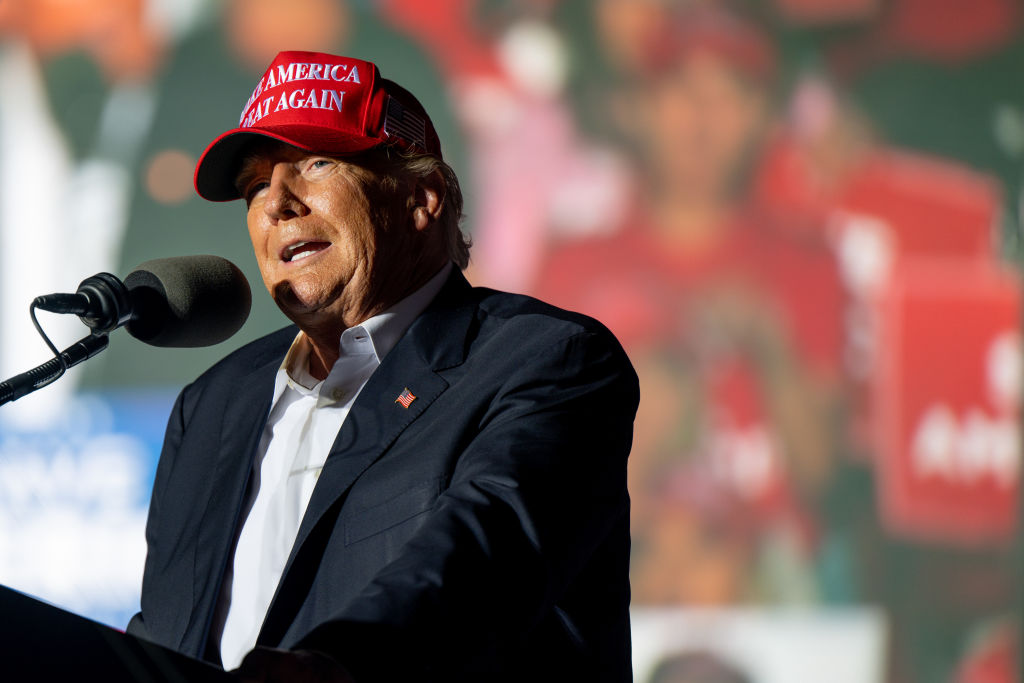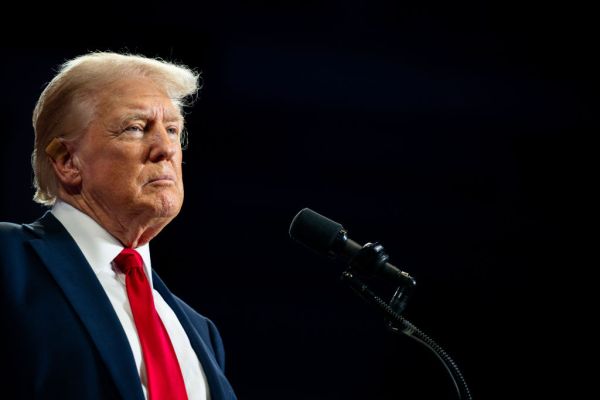I don’t want to become known as the guy at The Dispatch who obsesses over every light jab thrown between Donald Trump and Ron DeSantis ahead of their 2024 primary death match.
But I am that guy, so I might as well own it. Plus, it matters. A lot.
This makes three posts on the simmering Trump/DeSantis feud since I came aboard, the first of which was published on day one and the second just three days ago. I have an excuse, though: The jabs are becoming heavier, more frequent, and more purposeful as we approach an election in Florida that might upend the next presidential contest.
On Wednesday Politico revealed one of the hardest shots delivered yet, the fact that Trump will hold a rally in Miami two days before polls open for Marco Rubio—and only Marco Rubio. The invitation for the other guy on the ballot in Florida this year must have gotten lost in the mail.
The apparent snub angered some people within DeSantis’ orbit, who complained that the Florida governor’s team was not informed of the rally prior to Trump announcing it. The timing of the Trump and Rubio event means any campaign event DeSantis holds that day won’t get as much attention during the all-important final stretch of the 2022 midterms.
“You’ve got the Sunday before Election Day totally hijacked by Trump parachuting in on Trump Force One taking up the whole day,” said a longtime Republican consultant who is close to the governor. “No Republican could go to a DeSantis event that day. None. And DeSantis won’t be here? This is big.”
Another person who is influential in DeSantis’ world said it was “an elbow to Ron’s throat” and blamed Trump advisers.
The “light jab” stage is over, it seems. We’ve entered the “elbow to the throat” phase of the Trump/DeSantis relationship.
Notably, Politico doesn’t specify whether it was Trump or Rubio who proposed the idea of a rally, only that the two spoke about it. Typically it would be the candidate who requests an appearance from a popular party figure to galvanize the local base, but in this case I’m not so sure. Rubio doesn’t need Trump’s help in Florida, not in this national environment and certainly not in Miami-Dade County.
Rubio led Democrat Val Demings by a daunting 7.4 points in the RealClearPolitics average as of yesterday, an advantage that’s grown lately as polls everywhere have shifted toward Republicans. The last time he and Trump were on a ballot together, in 2016, he outperformed Trump by nearly 10 points in Miami-Dade. Granted, Trump vastly increased his share of the vote in that county in 2020 but there’s no reason to think Rubio won’t perform just as well there next month with DeSantis at the top of the ticket.
If anything, having Trump blow into town at the last second hurts Rubio more than it helps. It’s tantamount to taunting Florida’s demoralized Democratic voters by reminding them that Marco has become a flunky of the Republican they hate most. Trump’s rally may do more for Demings’ turnout than for Rubio’s.
So the rally doesn’t make sense for the candidate. But it does make sense for Trump.
Trump must be following the polls in Florida and watching with trepidation as Rubio’s and especially DeSantis’ leads in the polls keep ballooning. He hates the idea of Republicans overperforming without his help since it risks convincing GOP voters that they might do fine electorally without him, if not better. Now they’re on the cusp of routing the Democrats in Florida, an unthinkable result as recently as a few years ago. So here comes Trump, bounding in at the last second and racing to the front of the parade so that he can turn around after Election Day and say, “You’re welcome.”
DeSantis’ numbers must be cause for special anxiety, though, given the stakes for 2024. I won’t belabor my argument that the better the governor does, the worse it is for Trump—you can read that here—but instead will direct you to the fact that DeSantis now looks poised to outperform even the rosiest expectations. At the start of October he led Charlie Crist by six points in FiveThirtyEight’s average. Yesterday that lead reached 9.9 points. He’s led by double digits in seven of the last eight polls tracked by that site, one of which had him up by 14. In the RealClearPolitics average, he’s ahead by 11.2.
Any future DeSantis presidential campaign will focus heavily on his alleged electability advantage over Trump, and his margin over Crist will be Exhibit A in that argument. I suspect DeSantis’ team hoped at the start of the campaign to win their race by at least six points since that would mean their guy had doubled Trump’s margin of victory over Biden in Florida in 2020. As things stand, there’s a chance he’ll quadruple Trump’s margin, which will turbo-charge his electability pitch. “DeSantis 2024: The man who turned the ultimate swing state into a laugher.”
It gets worse for Trump. DeSantis may be on the verge of winning Miami-Dade County outright, giving him an irresistible talking point that he’s the man the GOP needs to win over Latino voters nationally.
“I think Ron DeSantis will win Miami-Dade County,” said Evan Ross, a longtime South Florida-based Democratic consultant. “Democratic voters are not at all excited or motivated by Charlie’s campaign. Right now, I think it will be close, but I think DeSantis beats Crist here.”
Ross recently conducted polling in Miami-Dade County that found roughly 15 percent of Democrats saying they would not vote for Crist, while 5 percent of Republicans said they wouldn’t vote for DeSantis. In the county, DeSantis’ approval rating with Republicans is plus-89 percent, while Crist’s approval rating is just plus-49 with Democrats. Democrats still lead Republicans in overall voter registration numbers in Miami-Dade, more than 575,000 to 435,000-plus, though that gap is decreasing.
“The only thing that might give Charlie Crist a chance of becoming governor would be DeSantis aggressively campaigning for him over the next two weeks,” Ross said. “Translation: It’s over. And it’s going to be ugly.”
The population of Miami-Dade is nearly 71 percent Hispanic. DeSantis also leads Crist among Hispanics statewide, per a recent NBC poll. Trump is doubtless taking all of that in, foreseeing the avalanche of DeSantis 2024 media hype that’ll ensue if those numbers bear out on Election Day, and realizing what effect it might have on Republican voters nationally.
It’s all too easy to imagine him hastily dialing up Rubio and demanding that they hold a last-second rally together in Miami to give him a pretext to take credit in case the party’s candidates perform as well in the county as it appears they will.
Taking credit for DeSantis’ political success has become a habit for Trump.
As I’ve noted previously, he can’t answer a question about the governor without reminding the audience that his endorsement propelled DeSantis to victory in the 2018 gubernatorial primary. He’s keen to make the case to GOP voters ahead of 2024 that DeSantis is a nobody whose prominence derives entirely from Trump’s popularity. Swooping into Miami for an election-eve event so that he can claim later that the governor owes his margin of victory to Trump-driven Republican turnout is part of that.
But there’s more to it. The fact that ambitious Republicans in the state will feel obliged to attend the rally despite DeSantis being snubbed is a classic case of Trump practicing the “politics of dominance,” attempting to put the younger man in his place by reminding him of his inferiority within the Republican hierarchy. DeSantis has gotten under Trump’s skin repeatedly in the past for refusing to show him the deference to which Trump believes he’s entitled, according to media reports.
Having cited several examples of that before, I won’t belabor them either. But I’m guessing Trump was unhappy with this non-answer from DeSantis’ recent debate with Crist.
Reportedly he resents that DeSantis won’t pledge to stand aside in 2024 if Trump runs, a pledge more obsequious Republicans like Nikki Haley have taken. He also allegedly resents that DeSantis hasn’t sought his endorsement and has suffered no penalty at all from Florida’s Republican voters for having failed to obtain it. We know for a fact that he resents DeSantis for having cut a robocall for Colorado Senate nominee Joe O’Dea days after Trump dubbed O’Dea a disloyal RINO for saying that he wants a different presidential nominee in the next cycle.
The more DeSantis moves to establish himself as his own man, an independent power player within the party, the more threatened Trump appears to feel. As I write this on Thursday afternoon, the top post on his Truth Social feed is a video of his old frenemy, Megyn Kelly, speculating that Trump would mop the floor with DeSantis in a 2024 primary. Trump’s caption to the video: “I AGREE!”
He regards DeSantis as an impudent ingrate—an overrated impudent ingrate at that—and, being a toxic narcissist, is looking for ways to demean him in order to reassert his superior rank. Usually that means reminding people that he “made” DeSantis in 2018 but now it means trying to bigfoot him in the final week of the midterm campaign by excluding him from a major rally in his own backyard.
Some of his more obnoxious and cutthroat cronies are getting in on the action too.
As DeSantis has become more openly defiant, I’ve come to suspect Trump won’t endorse him in 2024 even if Trump opts against running for president himself. I’m not as sold as others are that Kari Lake will zoom past DeSantis to become the MAGA darling in a Trump-less field if she wins her gubernatorial election in Arizona, but if Trump were to back her enthusiastically the case grows stronger. Lake is certainly more of a true-blue crank than DeSantis is, which gives her a populist “authenticity” edge. And Trump would surely prefer a nominee who vacuums the red carpet for him when he comes to town to someone who won’t even ask for his endorsement.
The rally with Rubio could backfire.
It’s conceivable that Trump’s team organized it and omitted DeSantis because they wanted the governor to hear of it and come crawling to them for an invitation. (Politics of dominance!) I doubt he will. He doesn’t need to, as he’s on track to win easily whether or not he attends. And after spending his entire first term suffering through Trump taking credit for his political ascent, I’m sure he’s keen to deny him a new opportunity to do so as a matter of simple ego.
If DeSantis does skip the rally and ends up crushing Crist anyway, he and his team will claim that it proves how little he owes to Trump for his success. He didn’t need a joint appearance with Trump, let alone Trump’s endorsement, to produce a landslide. He did it all by himself. He’s a force within the party in his own right.
In fact, if the polling averages are accurate, he’ll beat Crist by a wider margin than Rubio will beat Demings. What lesson might we draw from the fact that the candidate who didn’t do a last-minute event in Florida with Trump ended up outperforming the candidate who did?
I know which lesson the DeSantis 2024 campaign will draw from it.
It’ll be fascinating to see how the two men handle the day of the rally itself. Will DeSantis organize his own competing mega-rally to show Trump that he can command a huge audience even when the Great MAGA King is in town? Will he try to strongarm local Republican officials into attending his rally instead of Trump’s to prove that the Florida GOP is more loyal to him than they are to la Grande Orange?
How will Trump handle the elephant in the room (or rather, not in the room) at the rally with Rubio? He might ignore the subject of DeSantis entirely. Or he might badmouth DeSantis for his “disloyalty” in endorsing O’Dea after Trump had declared him MAGA persona non grata, which would amount to a last-second attempt by Trump to sabotage DeSantis’ campaign. Or, most interestingly, he might endorse DeSantis in absentia just so that he can point back later to that endorsement as having supposedly made the difference when DeSantis ends up beating Crist by double digits.
“Who cares?” you might say. “Why should we bother thinking about Trump vs. DeSantis at this stage?” Well, I’ll tell you.
The answer has to do with a rare moment of naivete from Liz Cheney. “I think that the party has either got to come back from where we are right now, which is a very dangerous and toxic place, or the party will splinter and there will be a new conservative party that rises,” she said last weekend on Meet The Press. “And if Donald Trump is the nominee of the Republican Party [in 2024], the party will shatter and there will be a conservative party that rises in its place.”
The party will not “shatter.” If the last six years have proved anything, it’s that Republican voters are willing to rationalize any manner of corruption in the name of keeping Democrats out of power.
However.
It’s possible that Trump winning his death match with DeSantis will shake loose a meaningful number of voters in the “zombie partisan” center of the party. I’ve written before that I conceptualize the modern GOP as 40 percent MAGA diehards, 10 percent Trump skeptics, and 50 percent who are inclined to vote for anything with an “R” after its name. But that 50 percent isn’t monolithic. No group is. There’s a segment of it, overrepresented in respectable conservative media, that seems to believe the party’s “Trump problem” is just that, a problem more or less limited to Donald Trump. Republican voters nominated a demagogue in 2016 because he was the only candidate in a huge field selling populism, their theory goes. Offer those voters a younger, smarter, more electable, and … somewhat less demagogic populist with a record of policy achievements—a Ron DeSantis, say—and they’ll do the right thing.
Will they? I guess we’ll see, won’t we?
Trump will run in 2024 on election denialism, spite, loyalty, and dominance. He’s never made much of a pretense of caring about policy beyond tariffs and building the wall and he’ll make less of a pretense next time. DeSantis will run on electability, of course, but also on policy—keeping schools open during the pandemic, the so-called “don’t say gay” bill, his dumb anti-Big Tech legislation, and so on. Republican primary voters will have a choice between a twice-impeached chud who incited an attack on Congress and the populist governor of Florida.
If they choose incorrectly, I have to believe that a chunk of that 50 percent will give up on the party. I’m not saying I do believe it; I’m saying I have to believe it, for the sake of my own sanity. It must be that some Republicans who reside outside the party’s cultish wing will regard the renomination of Trump after the insurrection as a dealbreaker, the death of their theory that the “Trump problem” is a Trump problem. An electorate that prefers Trump to DeSantis is an electorate that’s rotten, not one that’s making an uncomfortable choice with unpalatable options like John Kasich and Ted Cruz as its only alternatives.
The party won’t shatter in any event. But, the scales having fallen from their eyes, a slice of that 50 percent will head off to greener pastures. I think?
In one of his last posts at National Review, my colleague Kevin Williamson made the case that the “Trump problem” extends far beyond Donald Trump. “Does it just happen to end up hand-in-glove with Q-Anon kookery—with every quack, charlatan, cretin, crackpot, tiki-torch Nazi, and Brideshead-cosplaying dork across the fruited plain—or is there something profoundly wrong with this organization, its animating spirit, and its people?” he said of the GOP. Trump prevailing in his death match with DeSantis, as he’s favored to do, will force the right’s excuse-makers to squarely confront that question. How they respond may shape American politics for the next decade.









Please note that we at The Dispatch hold ourselves, our work, and our commenters to a higher standard than other places on the internet. We welcome comments that foster genuine debate or discussion—including comments critical of us or our work—but responses that include ad hominem attacks on fellow Dispatch members or are intended to stoke fear and anger may be moderated.